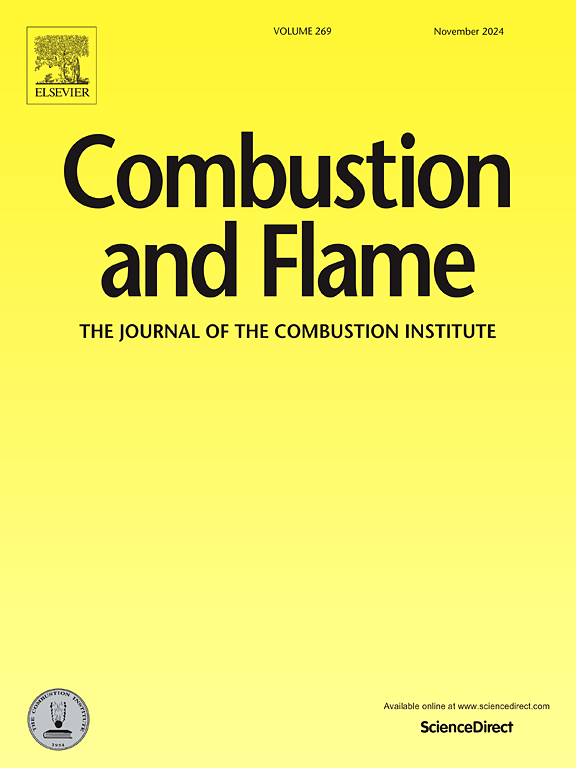C2H4/NH3 混合物热解过程中含氮多环芳烃形成的 ReaxFF 分子动力学研究
IF 5.8
2区 工程技术
Q2 ENERGY & FUELS
引用次数: 0
摘要
反应力场分子动力学(ReaxFF MD)模拟描述了 C2H4 和 C2H4/NH3 混合物热解的整个过程,包括燃料热解、多环芳烃/NPAHs 的形成和增长以及烟尘的形成。掺入 NH3 会通过分解 NH3 增加 H 自由基的浓度。然后,这些 H 自由基通过参与 H-萃取反应促进 C2H4 的消耗。C-N 物种(主要是 HCN、H2CN、C2N、CH3CN、NCCN 和 HC3N)的形成会清除参与多环芳烃和烟尘形成的 C 原子,从而抑制烟尘的形成。由于促进了 C-N 物种的形成,这种抑制作用会随着温度的升高而加强。最重要的是,根据实验和模拟结果首次确定了含 N 多环芳烃(NPAHs)的结构、形成和演化路径,揭示了 NPAHs 中的 N 原子几乎总是存在于附着在芳香环上的碳链中,而几乎不进入环中形成杂环结构。模拟进一步发现,当温度小于 2500 K 时,第一个含 N 的芳香环是通过苯基与小的 C-N 物种(如 HCN 和 CN 自由基)反应形成的,随后主要通过 HACA 机理增加新环。在温度高于 2500 K 时,NPAH 的形成和增长主要是通过含 N 碳链的连续附着和循环缩聚-环化反应进行的。识别新的 C-N 物种,尤其是 NPAHs,将有助于改进氨混合燃烧的动力学机制。本文章由计算机程序翻译,如有差异,请以英文原文为准。
ReaxFF molecular dynamics study of N-containing PAHs formation in the pyrolysis of C2H4/NH3 mixtures
The reactive force field molecular dynamics (ReaxFF MD) simulations are performed to depict the whole process including fuel pyrolysis, the formation and growth of PAHs/NPAHs and soot formation in the pyrolysis of C2H4 and C2H4/NH3 mixtures. NH3 doping increases the concentration of H radicals through the decomposition of NH3. These H radicals then promote the consumption of C2H4 by participating in H-abstraction reactions. The formation of C-N species (mainly HCN, H2CN, C2N, CH3CN, NCCN, and HC3N) removes the C atoms participating in the formation of PAHs and soot, thus inhibiting the formation of soot. And such inhibitory effect is strengthened with increasing temperature due to the promoted formation of C-N species. Most importantly, the structure, formation and evolution paths of N-containing PAHs (NPAHs) are identified based on the experimental and simulation results for the first time, revealing that N atoms in the NPAHs are almost always present in the carbon chains attached to the aromatic rings while barely enter the rings to form heterocyclic structure. The simulations further reveal that when the temperature is less than 2500 K, the first N-containing aromatic ring is formed through the reaction of phenyl with small C-N species (such as HCN and CN radicals), followed by the increase of new rings primarily via the HACA mechanism. At temperatures greater than 2500 K, the formation and growth of NPAHs are dominated by the continuous attachment of N-containing carbon chains and cyclic polycondensation-cyclization reactions. The identification of new C-N species especially NPAHs would help improve the kinetic mechanisms for ammonia blending combustion.
求助全文
通过发布文献求助,成功后即可免费获取论文全文。
去求助
来源期刊

Combustion and Flame
工程技术-工程:化工
CiteScore
9.50
自引率
20.50%
发文量
631
审稿时长
3.8 months
期刊介绍:
The mission of the journal is to publish high quality work from experimental, theoretical, and computational investigations on the fundamentals of combustion phenomena and closely allied matters. While submissions in all pertinent areas are welcomed, past and recent focus of the journal has been on:
Development and validation of reaction kinetics, reduction of reaction mechanisms and modeling of combustion systems, including:
Conventional, alternative and surrogate fuels;
Pollutants;
Particulate and aerosol formation and abatement;
Heterogeneous processes.
Experimental, theoretical, and computational studies of laminar and turbulent combustion phenomena, including:
Premixed and non-premixed flames;
Ignition and extinction phenomena;
Flame propagation;
Flame structure;
Instabilities and swirl;
Flame spread;
Multi-phase reactants.
Advances in diagnostic and computational methods in combustion, including:
Measurement and simulation of scalar and vector properties;
Novel techniques;
State-of-the art applications.
Fundamental investigations of combustion technologies and systems, including:
Internal combustion engines;
Gas turbines;
Small- and large-scale stationary combustion and power generation;
Catalytic combustion;
Combustion synthesis;
Combustion under extreme conditions;
New concepts.
 求助内容:
求助内容: 应助结果提醒方式:
应助结果提醒方式:


